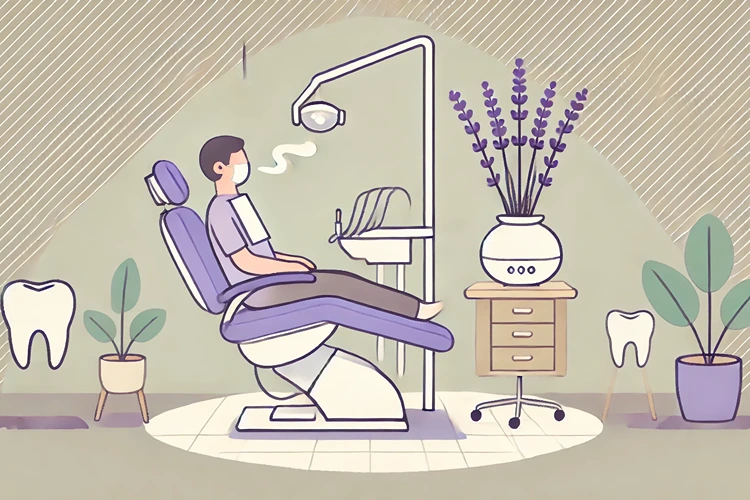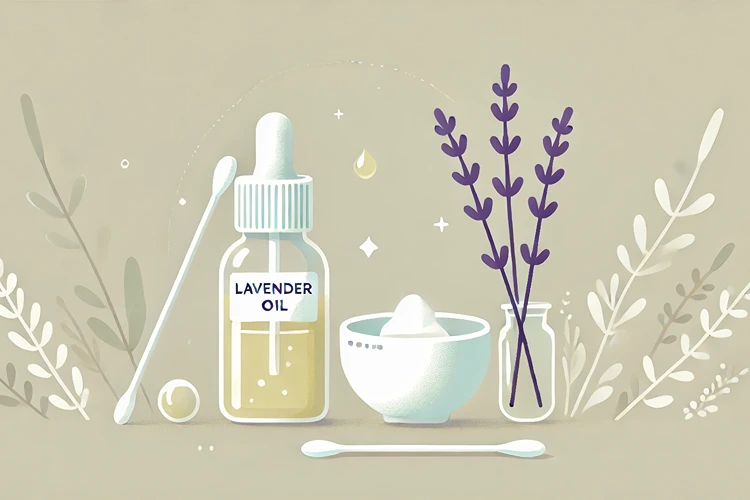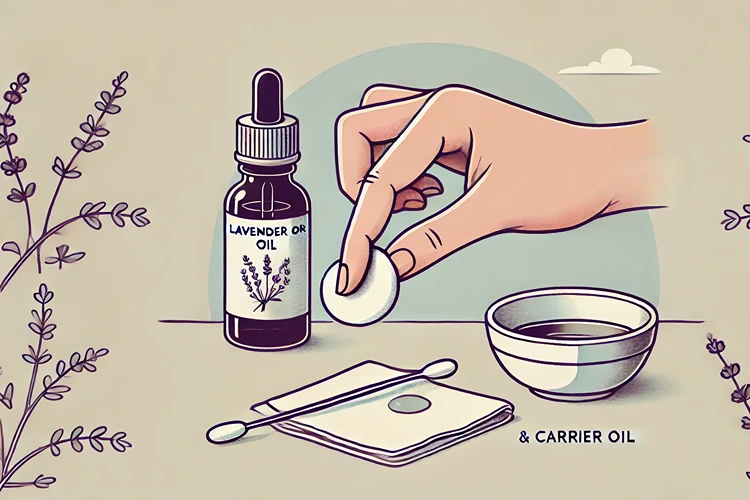
Aromatherapy with Lavender Oil for Anxiety in Dental Patients
Going to the dentist is one of those necessary but nerve-wracking experiences for many people. The idea of drills, needles, and even just sitting in the dentist’s chair can trigger significant anxiety. This is where aromatherapy with lavender oil for anxiety in dental patients comes into play. Lavender oil has long been cherished for its calming and therapeutic effects, making it a natural choice to help ease the nerves of those who dread their dental visits.
Imagine walking into your dentist’s office and instead of feeling that usual wave of nervousness, you’re greeted with the gentle, soothing aroma of lavender. This calming environment may help you relax, reduce tension, and allow the appointment to go more smoothly.
So, how exactly does lavender oil help manage dental anxiety? Let’s explore this age-old remedy and its modern-day applications in dental care.
How Does Lavender Oil Help with Anxiety?
Lavender oil has been used for centuries for its ability to reduce stress and anxiety. Scientifically, lavender contains compounds that interact with the brain to produce a calming effect. When inhaled, these compounds work on the amygdala—the part of the brain that processes fear and anxiety—calming the body and mind. This makes it an ideal solution for people who experience heightened anxiety, especially during medical or dental procedures.
Some of the key compounds in lavender oil include:
- Linalool – Known for its sedative effects, helping calm nerves.
- Linalyl acetate – Contributes to the relaxing properties of lavender oil.
- Camphor – Adds to its overall soothing qualities.
Inhaling lavender oil signals the brain to reduce the production of stress hormones, particularly cortisol. The outcome? Less anxiety and a more relaxed state of mind, which can make a world of difference for dental patients who might otherwise feel overwhelmed.
Is Lavender Oil Safe for Use in Dental Settings?
One of the major reasons lavender oil is so widely used in aromatherapy is because of its safety profile. It’s gentle enough for almost anyone to use, with very few reported side effects. Most patients won’t experience any adverse reactions, making it a safe addition to a dental anxiety management plan.
Helpful Hint:
If you’re worried about any possible reactions to lavender oil, always perform a patch test before inhaling it or applying it to the skin. If you’re visiting a dentist who uses aromatherapy, don’t hesitate to ask about the essential oils being used and whether they’ve been tested for safety.
Why Lavender Oil is Particularly Effective for Dental Patients
For dental patients, aromatherapy with lavender oil for anxiety is especially helpful because the sense of smell is directly linked to the brain’s emotional center. When someone walks into a dental clinic, the sterile smells of the office, combined with the sound of tools, can trigger stress. The introduction of lavender’s relaxing scent counteracts these stimuli, allowing patients to feel at ease.
Studies have shown that patients exposed to lavender aromatherapy prior to dental procedures reported lower levels of anxiety compared to those who weren’t exposed to the scent. The benefits include:
- A reduced feeling of tension and nervousness.
- Improved patient cooperation during procedures.
- Less need for sedative medications.
- An overall more pleasant experience at the dentist.
Stats:
One study published in the journal “Physiology & Behavior” found that dental patients who inhaled lavender oil before procedures reported a 45% decrease in anxiety levels compared to a control group.
How to Use Lavender Oil in a Dental Setting
So, how can dental offices effectively incorporate lavender oil to reduce patient anxiety? There are several ways to introduce this soothing essential oil into the environment, depending on the preferences of both the dental staff and patients.
Using a Diffuser
Aromatherapy diffusers are one of the most common methods for delivering lavender oil in a dental clinic. These devices disperse the essential oil into the air, creating a calming atmosphere that can immediately help patients relax as soon as they enter the office. A low concentration of lavender is usually enough to create a soothing effect without overwhelming the space.
Topical Application
Lavender oil can also be applied topically, though this requires careful attention to the concentration. Mixing a few drops of lavender essential oil with a carrier oil, such as coconut oil, can create a calming blend that can be massaged into pulse points like the wrists or temples.
Inhalation via Cotton Balls or Pads
Another simple yet effective way to use lavender oil is by placing a few drops on a cotton ball or pad. The patient can hold the cotton ball and inhale the scent as needed during the appointment. This method allows for more control over the intensity of the aroma.
Comparison of Lavender Oil Methods for Dental Anxiety
| Method | How It Works | Benefits | Best For |
|---|---|---|---|
| Diffuser in the Waiting Room | Releases lavender oil into the air, creating a calm environment. | Helps patients relax before their appointment, lowers anxiety. | General relaxation for all patients. |
| Topical Application (Pulse Points) | Lavender oil mixed with a carrier oil applied to the skin. | Targets anxiety directly, provides a personal sense of calm. | Patients sensitive to environmental scents. |
| Personal Inhaler | Small portable inhaler filled with lavender oil for direct inhalation. | Provides immediate calming effects, easy to use during procedures. | Patients with high anxiety during dental work. |
| Lavender-Infused Towels | Towels infused with lavender oil, given to patients to relax during the appointment. | Creates a spa-like experience, reduces tension in muscles. | Patients undergoing longer procedures. |
Frequently Asked Questions About Lavender Oil for Anxiety
Can Lavender Oil Really Replace Medication for Anxiety?
While lavender oil is an excellent natural remedy for mild to moderate anxiety, it shouldn’t be considered a replacement for prescribed medications in severe cases. For many patients, however, it serves as a helpful complement to traditional anxiety treatments.
Are There Any Side Effects of Using Lavender Oil?
Lavender oil is generally safe, but some individuals may experience allergic reactions, such as skin irritation or respiratory discomfort. It’s important to ensure the oil is diluted and used in appropriate concentrations, especially in a clinical setting.
In the next part of this article, we’ll explore more specific ways lavender oil can be incorporated into dental practices and offer practical tips for both patients and professionals.
How Can Dental Patients Use Lavender Oil at Home Before Appointments?
For dental patients who suffer from significant anxiety, the benefits of aromatherapy with lavender oil for anxiety can extend beyond the dentist’s office. In fact, using lavender oil at home before a dental appointment can help set the tone for a calmer, more relaxed experience. Here are some ways patients can incorporate lavender oil into their routine before heading to the dentist.
Lavender Oil Bath
Taking a bath infused with lavender oil the night before or the morning of a dental appointment can be an excellent way to unwind. Simply add a few drops of lavender essential oil to a warm bath and soak for 15-20 minutes. The steam will carry the aroma into the air, creating a spa-like environment that promotes relaxation.
Lavender-Scented Pillow
For those who struggle with pre-appointment nerves, spraying a lavender-scented mist on their pillow the night before can help promote a restful night’s sleep. Rest is crucial for managing anxiety, and lavender oil’s calming properties can assist with falling asleep faster and staying asleep longer.
Inhalation Techniques
Another option is simply inhaling lavender oil directly from a cotton pad or using a personal inhaler designed for essential oils. Taking a few deep breaths of lavender oil before leaving for the dentist can help ease nerves and reduce anticipatory anxiety.
Helpful Hint:
If you plan to use lavender oil before your dental appointment, start using it in small amounts a few days ahead of time. This allows your body to become familiar with the calming scent, making it easier to relax when the day arrives.
Can Lavender Oil Be Combined with Other Oils for Better Results?
While lavender oil is incredibly effective on its own, it can also be combined with other essential oils to enhance its anxiety-reducing effects. Some essential oils that complement lavender include:
- Bergamot Oil: Known for its uplifting and calming properties, bergamot can reduce feelings of nervousness and anxiety.
- Chamomile Oil: Chamomile’s gentle, soothing effects make it a perfect partner for lavender when combating stress.
- Frankincense Oil: Often used for meditation and relaxation, frankincense adds an earthy tone to lavender, enhancing its grounding properties.
By blending lavender oil with these complementary oils, dental patients may experience an even greater sense of calm, both before and during their dental visits. However, it’s important to remember that essential oils should always be diluted properly before use, whether applied topically or inhaled through a diffuser.
What Do the Studies Say About Lavender Oil and Anxiety in Dental Patients?
The use of aromatherapy with lavender oil for anxiety in dental patients is not just a folk remedy—it’s supported by scientific research. Numerous studies have highlighted the effectiveness of lavender oil in reducing anxiety levels, especially in high-stress environments like dental clinics.
Stats:
A study published in the journal “Anesthesia Progress” found that dental patients exposed to lavender oil aromatherapy before their appointments showed a significant reduction in anxiety, with anxiety scores decreasing by an average of 20%.
Another study in “Evidence-Based Complementary and Alternative Medicine” reported similar findings, where dental patients reported feeling less anxious and more relaxed after being exposed to lavender oil during their appointments.
Lavender vs. Other Anxiety Treatments in Dentistry
While traditional anxiety treatments in dentistry—such as sedatives or nitrous oxide—can be highly effective, they often come with side effects like drowsiness or nausea. Lavender oil, on the other hand, provides a natural, non-invasive way to manage anxiety without these side effects. It can also be used alongside other treatments, offering a complementary approach that helps calm patients before their appointment even begins.
Incorporating Aromatherapy into Your Dental Routine: A Step-by-Step Guide
If you’re a patient hoping to ease your dental anxiety with lavender oil, here’s a simple step-by-step guide on how to integrate this natural remedy into your dental routine:
- Prepare Your Lavender Oil: Purchase a high-quality, pure lavender essential oil. Make sure to avoid synthetic fragrances, as they won’t provide the same calming effects.
- Use a Diffuser: Set up a diffuser in your home or personal space. Add a few drops of lavender oil and allow the calming scent to fill the room in the days leading up to your appointment.
- Inhale Directly Before the Appointment: On the day of your dental visit, carry a cotton pad or small inhaler with lavender oil. Take deep breaths from it while waiting for your appointment.
- Communicate with Your Dentist: If you find lavender oil helpful, ask your dentist if they can diffuse lavender during your appointment for an added layer of comfort.
Can Lavender Oil Be Used During Post-Appointment Recovery?
Yes! Lavender oil is not only useful for managing anxiety leading up to and during dental appointments, but it can also aid in post-procedure recovery. Its anti-inflammatory and analgesic properties make it an excellent choice for easing discomfort and promoting healing after dental work.
For instance, applying a diluted lavender oil mixture to the jawline after a dental procedure can reduce swelling and provide relief from soreness. Additionally, inhaling lavender oil while recovering at home can continue to keep stress levels low and improve the overall recovery process.
Helpful Hint:
When using lavender oil for post-dental procedure recovery, make sure to dilute it properly with a carrier oil like coconut or almond oil. A few drops in a tablespoon of carrier oil is a safe and effective way to apply it topically.
Practical Tips for Dental Professionals: How to Incorporate Lavender Oil into Your Practice
Dentists can offer aromatherapy with lavender oil for anxiety as a non-invasive, complementary solution to ease patient discomfort. Whether you’re looking to create a more relaxing atmosphere or directly reduce patient anxiety, there are several ways to seamlessly integrate lavender oil into your practice.
Offer Lavender Aromatherapy as an Option
Not all patients may appreciate the scent of lavender, so it’s important to offer aromatherapy as an optional treatment. Have a brief consultation with patients before their appointment to see if they’d be interested in trying lavender aromatherapy. You can offer different forms, such as diffusers, personal inhalers, or even lavender-infused towels to help them relax.
Create a Relaxing Waiting Area
First impressions matter, especially for patients with anxiety. Using lavender oil in your waiting area can help set a calming tone from the moment a patient walks into your office. Place a diffuser with lavender oil in a central location where the aroma can fill the space without being overpowering.
Diffuse Lavender Oil During Procedures
For longer or more stressful procedures, dental professionals can consider using a diffuser in the treatment room itself. This allows patients to experience the continuous calming effects of lavender while undergoing the procedure. Just be sure to keep the concentration low to avoid overwhelming the senses.
Provide Lavender-Scented Towels or Eye Masks
To enhance the patient’s comfort, dental professionals can offer lavender-scented towels or eye masks before the procedure. These small touches help create a spa-like atmosphere, reducing anxiety and creating a positive experience for patients.
Helpful Hint:
Be mindful of any patients with sensitivities to essential oils or strong scents. Always ask for patient preferences before introducing aromatherapy into your practice.
Combining Aromatherapy with Other Relaxation Techniques in Dentistry
While lavender oil is an effective tool for reducing dental anxiety, its effects can be amplified when combined with other relaxation techniques. Dental professionals can offer a holistic approach by combining aromatherapy with lavender oil for anxiety with methods such as deep breathing, guided visualization, or even soft music.
Deep Breathing Exercises
Encouraging patients to practice deep breathing while inhaling lavender oil can significantly enhance the calming effects. Deep breathing activates the parasympathetic nervous system, promoting relaxation and reducing anxiety. By pairing this with lavender’s natural soothing properties, dental patients are likely to feel more at ease.
Guided Visualization
Some dentists offer guided visualization exercises, where patients are asked to close their eyes and imagine themselves in a peaceful, calm environment. Diffusing lavender oil during this process can further enhance the effectiveness of visualization, making patients feel more grounded and relaxed during their visit.
Soothing Music
Lavender oil pairs well with soft, soothing music. Whether it’s instrumental, nature sounds, or classical tunes, the combination of calming scents and sounds can work wonders for reducing anxiety levels. Dentists who integrate this multi-sensory approach can create a more tranquil and pleasant environment for anxious patients.
How Long Do the Effects of Lavender Oil Last During a Dental Procedure?
The calming effects of lavender oil for anxiety typically begin to take hold within a few minutes of inhalation, and the duration of its effects can last for up to an hour or more. This makes it an ideal solution for most dental procedures, which usually last within this time frame.
For longer procedures, however, dental professionals may want to refresh the scent by adding more lavender oil to the diffuser or offering patients another way to inhale the oil, such as through a personal inhaler or lavender-infused towel. This ensures that the calming effects remain present throughout the entire appointment.
Is Lavender Oil Aromatherapy Enough to Address Severe Dental Anxiety?
While aromatherapy with lavender oil for anxiety is an excellent natural remedy, it may not be enough for patients with severe dental anxiety or phobia. In these cases, lavender oil can serve as a complement to other anxiety management techniques, such as:
- Prescription anti-anxiety medications
- Conscious sedation (such as nitrous oxide)
- Cognitive-behavioral therapy (CBT) for dental phobia
- Distraction techniques, such as TV or virtual reality
It’s essential for dental professionals to assess the severity of each patient’s anxiety and offer a combination of treatments that will best suit their needs. Lavender oil works well in mild to moderate cases but may need to be paired with other interventions for more severe anxiety.
Is There Scientific Proof of Lavender Oil’s Impact on Dental Anxiety?
Multiple studies have supported the efficacy of lavender oil for anxiety, particularly in high-stress environments like dental offices. A growing body of research highlights the positive effects of lavender on patient anxiety levels, pain perception, and overall experience during medical procedures.
One notable study published in the journal “Community Dentistry and Oral Epidemiology” demonstrated that dental patients exposed to lavender aromatherapy had significantly lower levels of anxiety and discomfort compared to a control group. The researchers concluded that lavender oil could be a valuable addition to dental care for patients who suffer from anxiety.
Stats:
A study published in the “Journal of Dental Hygiene” revealed that patients exposed to lavender oil during their dental cleaning appointments reported a 30% reduction in anxiety symptoms.
Tips for Patients: How to Maximize the Benefits of Lavender Oil for Dental Anxiety
For patients who want to reduce dental anxiety using lavender oil, there are a few tips to keep in mind to ensure the best results:
1. Use Lavender Oil Regularly
Don’t just wait for the day of your dental appointment to start using lavender oil. Regular exposure to lavender oil in your daily routine can help build a positive association with the scent. The more familiar your brain becomes with lavender’s calming properties, the more effective it will be in reducing anxiety during stressful situations.
2. Create a Lavender Routine Before Appointments
Building a pre-appointment routine around lavender oil can help prepare your mind and body for the dental visit. Consider using lavender oil the night before to promote sleep, applying it in the morning before your appointment, and carrying a personal lavender inhaler with you to the office.
3. Communicate with Your Dentist
Let your dentist know if you plan on using lavender oil to manage anxiety. Some offices already incorporate aromatherapy, but if yours doesn’t, they may be open to allowing you to bring your own personal inhaler or lavender-scented product to the appointment.
Helpful Hint:
Always opt for 100% pure lavender essential oil to get the most benefits. Avoid synthetic lavender scents, as these products lack the therapeutic properties found in natural oils.
Patient Experiences and Feedback on Using Lavender Oil for Dental Anxiety
Many patients who suffer from dental anxiety have turned to aromatherapy with lavender oil for anxiety as a natural and effective way to manage their fears. From personal inhalers to diffusers in dental offices, lavender oil has received widespread positive feedback for its calming effects. Here are some common experiences and observations from patients who have used lavender oil during their dental appointments:
Calm from the Start
One of the most consistent pieces of feedback from patients is that lavender oil helps them feel calmer as soon as they walk into the dentist’s office. For many, the anxiety begins well before they sit in the chair, with nervousness often building from the moment they leave home. Lavender’s soothing scent provides an immediate sense of relief, allowing patients to feel more at ease as they prepare for their appointment.
“I was so anxious about my root canal, but the lavender oil my dentist diffused made a huge difference. I felt a sense of calm wash over me as soon as I walked into the office.” – Sarah J., Dental Patient
Easier Time During Procedures
Patients also report that using lavender oil during the actual dental procedure makes the experience more manageable. Whether inhaling lavender from a diffuser or a cotton pad, patients feel that it helps them stay relaxed, reducing the tension that often builds up during dental work.
“Normally, I grip the chair the whole time during a cleaning, but with lavender oil, I actually felt relaxed. It took my mind off the noises and sensations that usually make me anxious.” – Michael D., Dental Patient
Positive Associations with Future Dental Visits
Another benefit of using lavender oil for anxiety is that it helps create a more positive association with future dental appointments. Patients who consistently use lavender oil begin to associate the scent with a sense of calm, rather than fear, when they think about visiting the dentist. This positive reinforcement can gradually reduce anxiety over time, making dental visits less stressful in the long run.
“I used to dread my dental check-ups, but now, I actually don’t mind them as much. The lavender oil makes the whole experience much more bearable, and I don’t feel that wave of panic when I think about my next appointment.” – Emily R., Dental Patient
Lavender Oil Alternatives: What Other Essential Oils Help with Anxiety?
While lavender oil is highly effective for reducing anxiety, some patients may prefer alternatives or want to switch things up occasionally. Several other essential oils have anxiety-reducing properties that can be just as helpful in a dental setting. If lavender isn’t your preference, consider these alternatives:
Ylang Ylang Oil
Ylang ylang oil is known for its ability to reduce stress and promote relaxation. Its sweet, floral scent has been shown to lower blood pressure and heart rate, making it a great alternative for patients who experience high levels of stress or anxiety during dental appointments.
Rosemary Oil
Rosemary oil has a fresh, invigorating scent that is believed to boost cognitive performance and reduce stress. Its ability to improve mood and concentration can be particularly helpful for patients who feel overwhelmed or distracted by their anxiety during a dental visit.
Sweet Orange Oil
Sweet orange oil is another excellent alternative to lavender, offering a bright and cheerful scent that uplifts mood and reduces anxiety. Its citrus aroma is especially effective for those who may not respond well to floral or herbal scents like lavender.
Helpful Hint:
If you’re experimenting with different essential oils, try blending them to see which combinations work best for you. For example, combining sweet orange and lavender can create a balanced mix of calming and uplifting scents that work together to ease anxiety.
FAQs
Wrapping Up
Aromatherapy with lavender oil offers an excellent natural solution for managing dental anxiety. Its calming effects, proven by research, make it a valuable tool for both patients and dental professionals. Incorporating lavender oil for anxiety into a dental routine can significantly reduce stress and create a more positive experience for nervous patients. Whether you’re using it in the waiting room, during a procedure, or at home before an appointment, lavender oil provides an accessible and effective way to promote relaxation.






